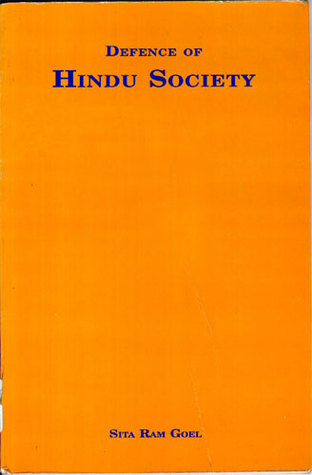Defence of Hindu Society by Sita Ram Goel - Review by Abhishek Desikan
Defence of Hindu Society is part of a series of books written by Sita Ram Goel to awaken Hindu society to the existential threats they face and the need to counter them. It is always awe-inspiring to read the boldness and clarity of thought employed by Sita Ram Goel, especially given the era he lived in and the opposition he faced. This book is no different than many of his other works, like India’s Secularism.
SRG makes a case for the Hindu society by highlighting that its spiritual center, Sanatana Dharma, has always sustained the Hindu community, especially during the onslaught of Islamic and Christian invasions. He claims that reviving this spiritual center is the only way Hindu society can be revitalized.
He echoes that we need to evaluate our ideologies in our terms and world view and not in an imperialist ethnocentric manner. He makes a mockery of oft-touted Hindu phrases like (ekam sad viprah bahudha vadanti and Sarva-dharma-samabhava, the latter coined by Mahatma Gandhi) and how Hindu society has tried to mold itself into a monotheistic framework to be accepted by such creeds.
SRG then explores Hindu spirituality and consciousness and its greatness. He explains why we have different concrete images and millions of Gods as forms are the way the sense-bound human mind can reach something of higher spiritual knowledge. Sanatana Dharma aspires for absolute truth, goodness, beauty, and power in every human being and explores human consciousness. And the way to God-discovery is through self-discovery. He compares this to other polytheistic cultures that existed worldwide before Christianity and Islam went about eliminating them almost entirely.
He then expounds on why Christianity and Islam impede the path of spiritual progress and divide humanity into warring camps using words like infidel and kafir. They profess to one almighty god with a prophet or savior to escape from eternal hell or be admitted to eternal heaven. A study of the genesis of these theologies explains why they’re not mere religions but are political ideologies with imperialist ambitions. He also shares personal anecdotes of his experiences with Muslim Sufis and Christian mystics. They were on the same path of universal spirituality as Sanatana Dharma but were forced to serve the ambitions of the theocratic nature of these states.
Finally, he explains how Nehruvain ideologues perverted the meaning of Secularism and the way out for Hindu society by acknowledging Islam and Christianity for what they represent and reviving its spiritual center. A short book that packs a punch.

Originally published here.